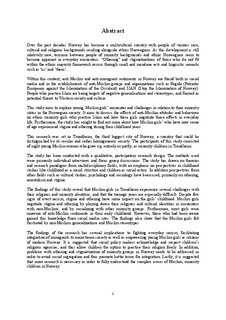| dc.description.abstract | Over the past decades Norway has become a multicultural country with people of various race, cultural and religious backgrounds residing alongside ethnic Norwegians. As this development is still relatively new, tensions between people of minority backgrounds and ethnic Norwegians seem to become apparent in everyday encounters. “Othering” and stigmatizations of those who do not fit within the ethnic majority framework occurs through small and mundane acts and linguistic remarks such as ‘us’ and ‘them’.
Within this context, anti Muslim and anti-immigrant sentiments in Norway are found both in social media and in the establishments of anti-Muslim groups and organizations such as Pegida (Patriotic Europeans against the Islamization of the Occident) and SIAN (Stop the Islamization of Norway). People who practice Islam are being targets of negative generalisations and stereotypes, and framed as potential threats to Western society and culture.
This study aims to explore young, Muslim girls’ encounter and challenges in relation to their minority status in the Norwegian society. It aims to discuss the effects of anti-Muslim attitudes and behaviour on ethnic minority girls who practice Islam and how these girls negotiate those effects in everyday life. Furthermore, the study has sought to find out more about how Muslim girls’ who have now come of age experienced stigma and othering during their childhood years.
This research was set in Trondheim, the third biggest city of Norway, a country that could be distinguished by its secular and rather homogeneous society. The participants of this study consisted of eight young Muslim women who grew up, entirely or partly, as minority children in Trondheim.
The study has been conducted with a qualitative, participatory research design. The methods used were primarily individual interviews and focus group discussions. The study has drawn on theories and research paradigms from multidisciplinary fields, with an emphasis on perspectives in childhood studies like childhood as a social structure and children as social actors. In addition perspectives from other fields such as cultural studies, psychology and sociology have been used, primarily on othering, orientalism and stigma.
The findings of this study reveal that Muslim girls in Trondheim experience several challenges with their religious and minority identities, and that the teenage years are especially difficult. Despite few signs of overt racism, stigma and othering have some impact on the girls’ childhood. Muslim girls negotiate stigma and othering by playing down their religious and cultural identities in encounters with non-Muslims, and by socializing with other minority groups. Furthermore, most girls were unaware of anti-Muslim sentiments in their early childhood. However, those who had been aware gained this knowledge from social media sites. The findings also show that the Muslim girls felt frustrated by non-Muslims generalizations and Muslim stereotypes.
The findings of the research has several implications to fighting everyday racism, facilitating integration of immigrants to mainstream society as well as empowering young Muslim girls as citizens of modern Norway. It is suggested that social policy makers acknowledge and respect children’s religious agencies, and thus allow children the option to practice their religion freely. In addition, problems with othering and stigmatization of minority groups in Norway needs to be addressed in order to avoid social segregation and thus promote better terms for integration. Lastly, it is suggested that more research is necessary in order to fully understand the complex issues of Muslim, minority children in Norway. | nb_NO |
